An In-Depth Literature Review on Corporate Social Responsibility
VerifiedAdded on 2020/11/12
|10
|2654
|171
Report
AI Summary
This report presents a literature review on Corporate Social Responsibility (CSR), examining its definition, objectives, and various types. The review explores the benefits of CSR, such as satisfied employees and customers, positive public relations, cost reduction, and long-term business advantages. It discusses the importance of CSR in enhancing a company's image, attracting customers, and contributing to societal welfare. The report covers environmental CSR, community-based CSR, human resource-based CSR, and philanthropic activities. The conclusion emphasizes the positive impact of CSR on brand image, stakeholders, and overall societal well-being. This literature review aims to provide a comprehensive understanding of CSR's role in modern business practices and its contribution to creating a sustainable and responsible business environment.

Study Skills
Paraphrase This Document
Need a fresh take? Get an instant paraphrase of this document with our AI Paraphraser
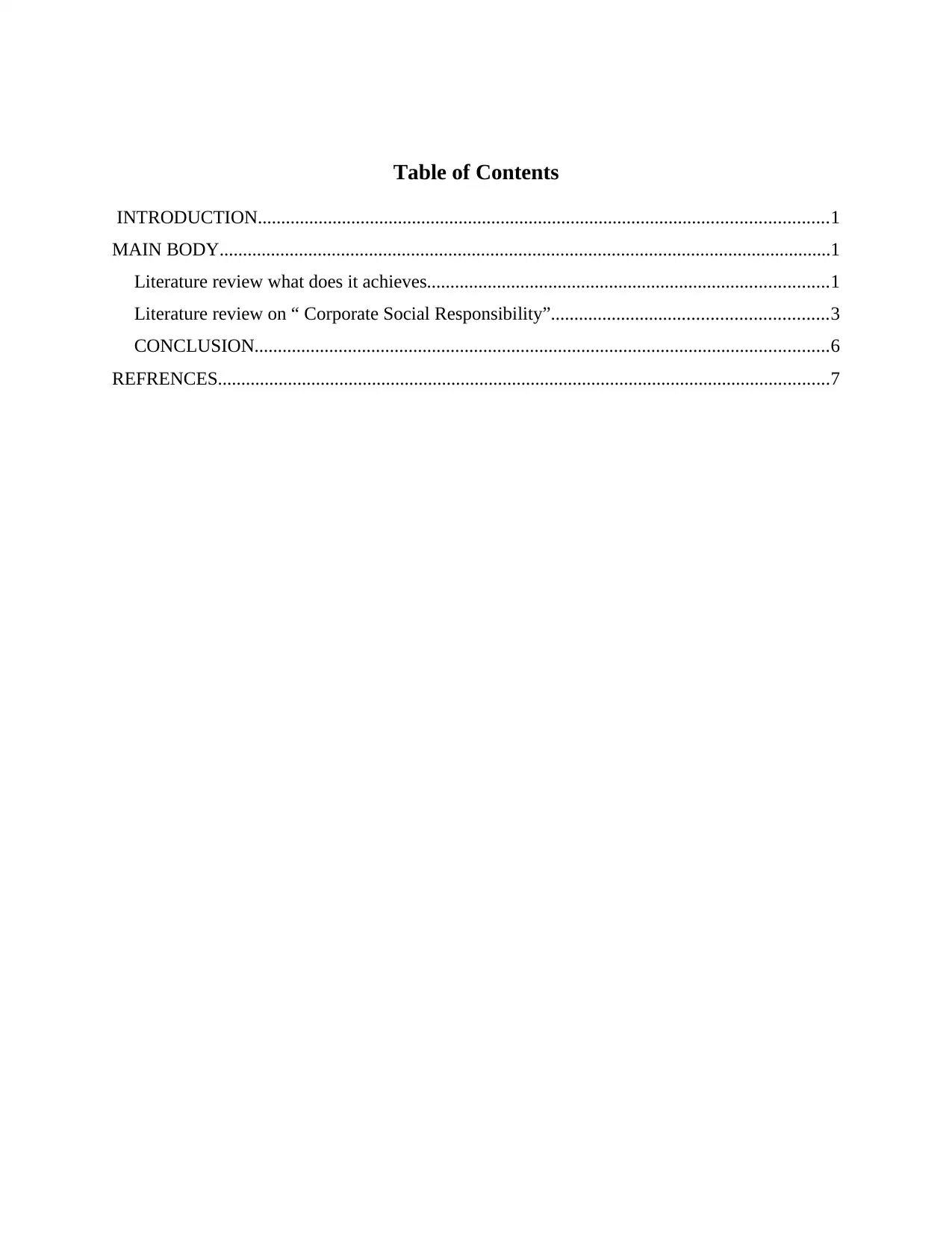
Table of Contents
INTRODUCTION..........................................................................................................................1
MAIN BODY...................................................................................................................................1
Literature review what does it achieves......................................................................................1
Literature review on “ Corporate Social Responsibility”...........................................................3
CONCLUSION...........................................................................................................................6
REFRENCES...................................................................................................................................7
INTRODUCTION..........................................................................................................................1
MAIN BODY...................................................................................................................................1
Literature review what does it achieves......................................................................................1
Literature review on “ Corporate Social Responsibility”...........................................................3
CONCLUSION...........................................................................................................................6
REFRENCES...................................................................................................................................7
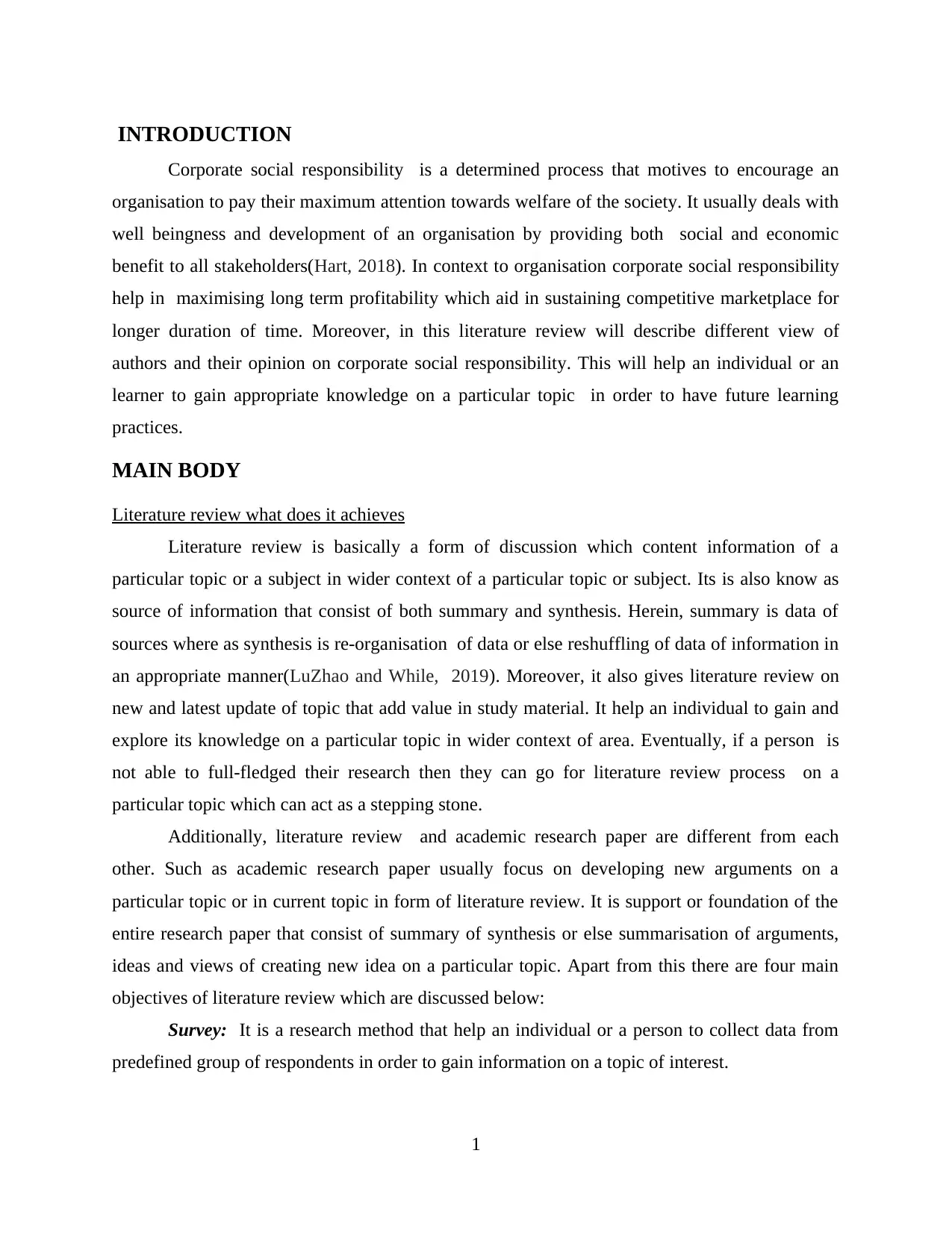
INTRODUCTION
Corporate social responsibility is a determined process that motives to encourage an
organisation to pay their maximum attention towards welfare of the society. It usually deals with
well beingness and development of an organisation by providing both social and economic
benefit to all stakeholders(Hart, 2018). In context to organisation corporate social responsibility
help in maximising long term profitability which aid in sustaining competitive marketplace for
longer duration of time. Moreover, in this literature review will describe different view of
authors and their opinion on corporate social responsibility. This will help an individual or an
learner to gain appropriate knowledge on a particular topic in order to have future learning
practices.
MAIN BODY
Literature review what does it achieves
Literature review is basically a form of discussion which content information of a
particular topic or a subject in wider context of a particular topic or subject. Its is also know as
source of information that consist of both summary and synthesis. Herein, summary is data of
sources where as synthesis is re-organisation of data or else reshuffling of data of information in
an appropriate manner(LuZhao and While, 2019). Moreover, it also gives literature review on
new and latest update of topic that add value in study material. It help an individual to gain and
explore its knowledge on a particular topic in wider context of area. Eventually, if a person is
not able to full-fledged their research then they can go for literature review process on a
particular topic which can act as a stepping stone.
Additionally, literature review and academic research paper are different from each
other. Such as academic research paper usually focus on developing new arguments on a
particular topic or in current topic in form of literature review. It is support or foundation of the
entire research paper that consist of summary of synthesis or else summarisation of arguments,
ideas and views of creating new idea on a particular topic. Apart from this there are four main
objectives of literature review which are discussed below:
Survey: It is a research method that help an individual or a person to collect data from
predefined group of respondents in order to gain information on a topic of interest.
1
Corporate social responsibility is a determined process that motives to encourage an
organisation to pay their maximum attention towards welfare of the society. It usually deals with
well beingness and development of an organisation by providing both social and economic
benefit to all stakeholders(Hart, 2018). In context to organisation corporate social responsibility
help in maximising long term profitability which aid in sustaining competitive marketplace for
longer duration of time. Moreover, in this literature review will describe different view of
authors and their opinion on corporate social responsibility. This will help an individual or an
learner to gain appropriate knowledge on a particular topic in order to have future learning
practices.
MAIN BODY
Literature review what does it achieves
Literature review is basically a form of discussion which content information of a
particular topic or a subject in wider context of a particular topic or subject. Its is also know as
source of information that consist of both summary and synthesis. Herein, summary is data of
sources where as synthesis is re-organisation of data or else reshuffling of data of information in
an appropriate manner(LuZhao and While, 2019). Moreover, it also gives literature review on
new and latest update of topic that add value in study material. It help an individual to gain and
explore its knowledge on a particular topic in wider context of area. Eventually, if a person is
not able to full-fledged their research then they can go for literature review process on a
particular topic which can act as a stepping stone.
Additionally, literature review and academic research paper are different from each
other. Such as academic research paper usually focus on developing new arguments on a
particular topic or in current topic in form of literature review. It is support or foundation of the
entire research paper that consist of summary of synthesis or else summarisation of arguments,
ideas and views of creating new idea on a particular topic. Apart from this there are four main
objectives of literature review which are discussed below:
Survey: It is a research method that help an individual or a person to collect data from
predefined group of respondents in order to gain information on a topic of interest.
1
⊘ This is a preview!⊘
Do you want full access?
Subscribe today to unlock all pages.

Trusted by 1+ million students worldwide
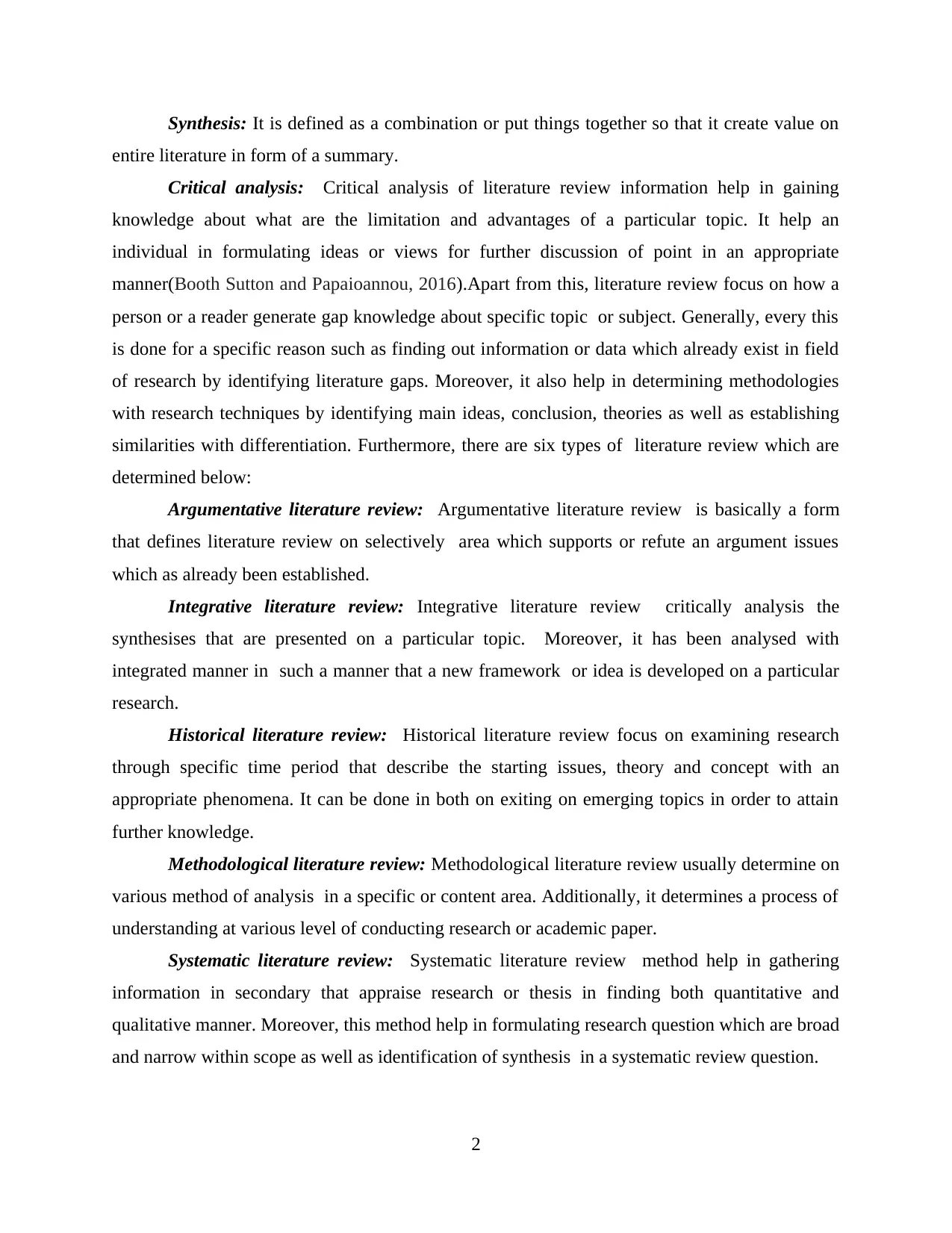
Synthesis: It is defined as a combination or put things together so that it create value on
entire literature in form of a summary.
Critical analysis: Critical analysis of literature review information help in gaining
knowledge about what are the limitation and advantages of a particular topic. It help an
individual in formulating ideas or views for further discussion of point in an appropriate
manner(Booth Sutton and Papaioannou, 2016).Apart from this, literature review focus on how a
person or a reader generate gap knowledge about specific topic or subject. Generally, every this
is done for a specific reason such as finding out information or data which already exist in field
of research by identifying literature gaps. Moreover, it also help in determining methodologies
with research techniques by identifying main ideas, conclusion, theories as well as establishing
similarities with differentiation. Furthermore, there are six types of literature review which are
determined below:
Argumentative literature review: Argumentative literature review is basically a form
that defines literature review on selectively area which supports or refute an argument issues
which as already been established.
Integrative literature review: Integrative literature review critically analysis the
synthesises that are presented on a particular topic. Moreover, it has been analysed with
integrated manner in such a manner that a new framework or idea is developed on a particular
research.
Historical literature review: Historical literature review focus on examining research
through specific time period that describe the starting issues, theory and concept with an
appropriate phenomena. It can be done in both on exiting on emerging topics in order to attain
further knowledge.
Methodological literature review: Methodological literature review usually determine on
various method of analysis in a specific or content area. Additionally, it determines a process of
understanding at various level of conducting research or academic paper.
Systematic literature review: Systematic literature review method help in gathering
information in secondary that appraise research or thesis in finding both quantitative and
qualitative manner. Moreover, this method help in formulating research question which are broad
and narrow within scope as well as identification of synthesis in a systematic review question.
2
entire literature in form of a summary.
Critical analysis: Critical analysis of literature review information help in gaining
knowledge about what are the limitation and advantages of a particular topic. It help an
individual in formulating ideas or views for further discussion of point in an appropriate
manner(Booth Sutton and Papaioannou, 2016).Apart from this, literature review focus on how a
person or a reader generate gap knowledge about specific topic or subject. Generally, every this
is done for a specific reason such as finding out information or data which already exist in field
of research by identifying literature gaps. Moreover, it also help in determining methodologies
with research techniques by identifying main ideas, conclusion, theories as well as establishing
similarities with differentiation. Furthermore, there are six types of literature review which are
determined below:
Argumentative literature review: Argumentative literature review is basically a form
that defines literature review on selectively area which supports or refute an argument issues
which as already been established.
Integrative literature review: Integrative literature review critically analysis the
synthesises that are presented on a particular topic. Moreover, it has been analysed with
integrated manner in such a manner that a new framework or idea is developed on a particular
research.
Historical literature review: Historical literature review focus on examining research
through specific time period that describe the starting issues, theory and concept with an
appropriate phenomena. It can be done in both on exiting on emerging topics in order to attain
further knowledge.
Methodological literature review: Methodological literature review usually determine on
various method of analysis in a specific or content area. Additionally, it determines a process of
understanding at various level of conducting research or academic paper.
Systematic literature review: Systematic literature review method help in gathering
information in secondary that appraise research or thesis in finding both quantitative and
qualitative manner. Moreover, this method help in formulating research question which are broad
and narrow within scope as well as identification of synthesis in a systematic review question.
2
Paraphrase This Document
Need a fresh take? Get an instant paraphrase of this document with our AI Paraphraser
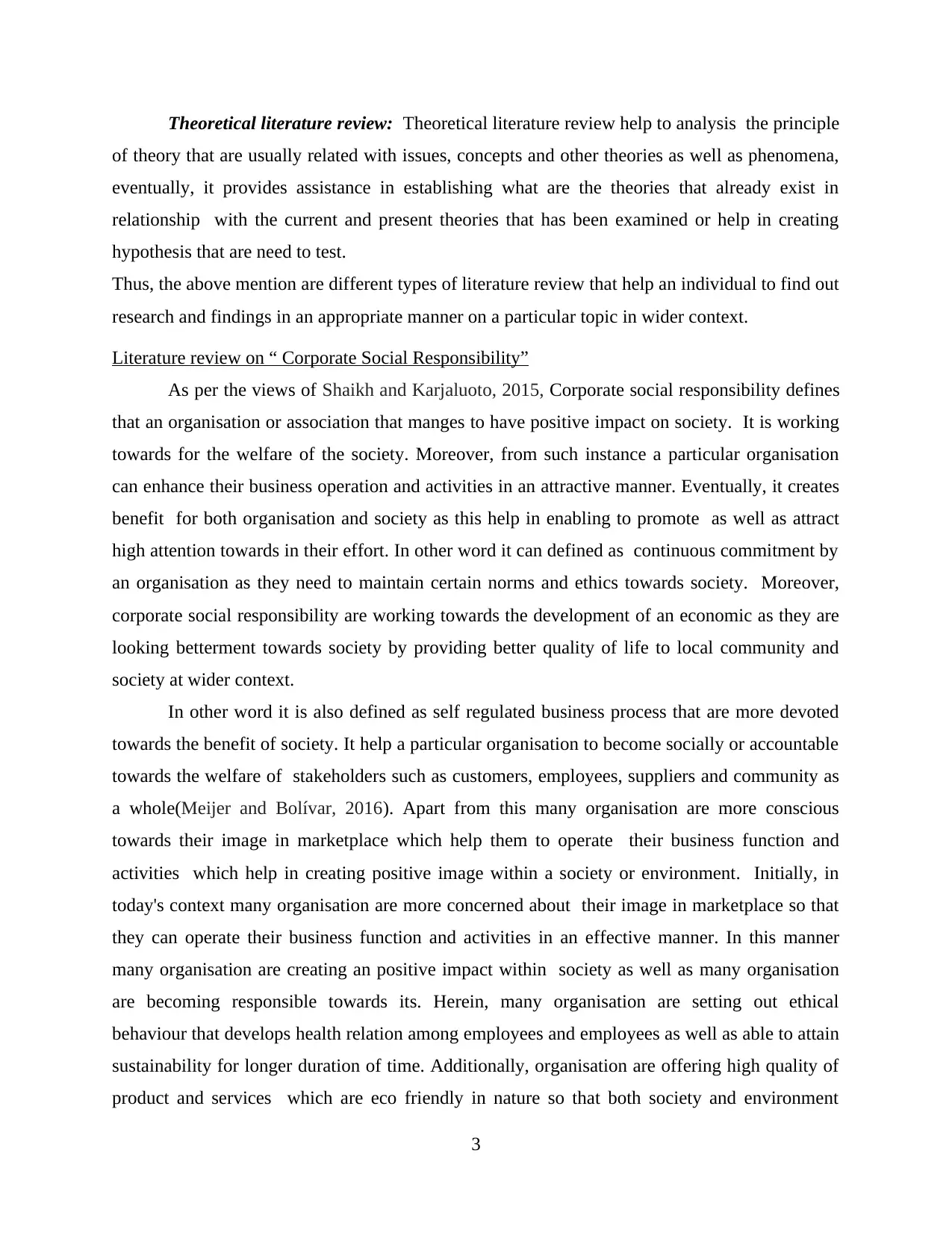
Theoretical literature review: Theoretical literature review help to analysis the principle
of theory that are usually related with issues, concepts and other theories as well as phenomena,
eventually, it provides assistance in establishing what are the theories that already exist in
relationship with the current and present theories that has been examined or help in creating
hypothesis that are need to test.
Thus, the above mention are different types of literature review that help an individual to find out
research and findings in an appropriate manner on a particular topic in wider context.
Literature review on “ Corporate Social Responsibility”
As per the views of Shaikh and Karjaluoto, 2015, Corporate social responsibility defines
that an organisation or association that manges to have positive impact on society. It is working
towards for the welfare of the society. Moreover, from such instance a particular organisation
can enhance their business operation and activities in an attractive manner. Eventually, it creates
benefit for both organisation and society as this help in enabling to promote as well as attract
high attention towards in their effort. In other word it can defined as continuous commitment by
an organisation as they need to maintain certain norms and ethics towards society. Moreover,
corporate social responsibility are working towards the development of an economic as they are
looking betterment towards society by providing better quality of life to local community and
society at wider context.
In other word it is also defined as self regulated business process that are more devoted
towards the benefit of society. It help a particular organisation to become socially or accountable
towards the welfare of stakeholders such as customers, employees, suppliers and community as
a whole(Meijer and Bolívar, 2016). Apart from this many organisation are more conscious
towards their image in marketplace which help them to operate their business function and
activities which help in creating positive image within a society or environment. Initially, in
today's context many organisation are more concerned about their image in marketplace so that
they can operate their business function and activities in an effective manner. In this manner
many organisation are creating an positive impact within society as well as many organisation
are becoming responsible towards its. Herein, many organisation are setting out ethical
behaviour that develops health relation among employees and employees as well as able to attain
sustainability for longer duration of time. Additionally, organisation are offering high quality of
product and services which are eco friendly in nature so that both society and environment
3
of theory that are usually related with issues, concepts and other theories as well as phenomena,
eventually, it provides assistance in establishing what are the theories that already exist in
relationship with the current and present theories that has been examined or help in creating
hypothesis that are need to test.
Thus, the above mention are different types of literature review that help an individual to find out
research and findings in an appropriate manner on a particular topic in wider context.
Literature review on “ Corporate Social Responsibility”
As per the views of Shaikh and Karjaluoto, 2015, Corporate social responsibility defines
that an organisation or association that manges to have positive impact on society. It is working
towards for the welfare of the society. Moreover, from such instance a particular organisation
can enhance their business operation and activities in an attractive manner. Eventually, it creates
benefit for both organisation and society as this help in enabling to promote as well as attract
high attention towards in their effort. In other word it can defined as continuous commitment by
an organisation as they need to maintain certain norms and ethics towards society. Moreover,
corporate social responsibility are working towards the development of an economic as they are
looking betterment towards society by providing better quality of life to local community and
society at wider context.
In other word it is also defined as self regulated business process that are more devoted
towards the benefit of society. It help a particular organisation to become socially or accountable
towards the welfare of stakeholders such as customers, employees, suppliers and community as
a whole(Meijer and Bolívar, 2016). Apart from this many organisation are more conscious
towards their image in marketplace which help them to operate their business function and
activities which help in creating positive image within a society or environment. Initially, in
today's context many organisation are more concerned about their image in marketplace so that
they can operate their business function and activities in an effective manner. In this manner
many organisation are creating an positive impact within society as well as many organisation
are becoming responsible towards its. Herein, many organisation are setting out ethical
behaviour that develops health relation among employees and employees as well as able to attain
sustainability for longer duration of time. Additionally, organisation are offering high quality of
product and services which are eco friendly in nature so that both society and environment
3
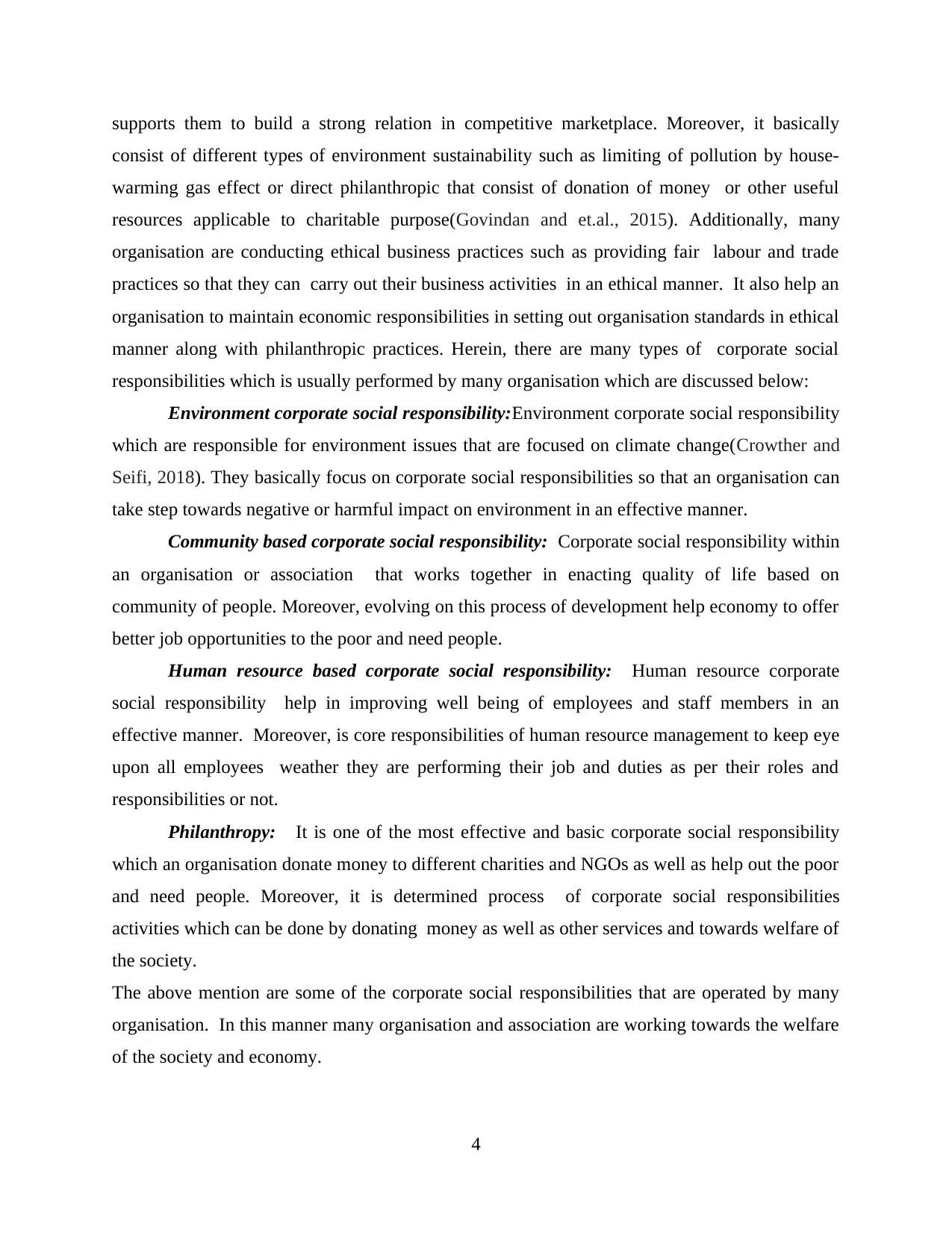
supports them to build a strong relation in competitive marketplace. Moreover, it basically
consist of different types of environment sustainability such as limiting of pollution by house-
warming gas effect or direct philanthropic that consist of donation of money or other useful
resources applicable to charitable purpose(Govindan and et.al., 2015). Additionally, many
organisation are conducting ethical business practices such as providing fair labour and trade
practices so that they can carry out their business activities in an ethical manner. It also help an
organisation to maintain economic responsibilities in setting out organisation standards in ethical
manner along with philanthropic practices. Herein, there are many types of corporate social
responsibilities which is usually performed by many organisation which are discussed below:
Environment corporate social responsibility:Environment corporate social responsibility
which are responsible for environment issues that are focused on climate change(Crowther and
Seifi, 2018). They basically focus on corporate social responsibilities so that an organisation can
take step towards negative or harmful impact on environment in an effective manner.
Community based corporate social responsibility: Corporate social responsibility within
an organisation or association that works together in enacting quality of life based on
community of people. Moreover, evolving on this process of development help economy to offer
better job opportunities to the poor and need people.
Human resource based corporate social responsibility: Human resource corporate
social responsibility help in improving well being of employees and staff members in an
effective manner. Moreover, is core responsibilities of human resource management to keep eye
upon all employees weather they are performing their job and duties as per their roles and
responsibilities or not.
Philanthropy: It is one of the most effective and basic corporate social responsibility
which an organisation donate money to different charities and NGOs as well as help out the poor
and need people. Moreover, it is determined process of corporate social responsibilities
activities which can be done by donating money as well as other services and towards welfare of
the society.
The above mention are some of the corporate social responsibilities that are operated by many
organisation. In this manner many organisation and association are working towards the welfare
of the society and economy.
4
consist of different types of environment sustainability such as limiting of pollution by house-
warming gas effect or direct philanthropic that consist of donation of money or other useful
resources applicable to charitable purpose(Govindan and et.al., 2015). Additionally, many
organisation are conducting ethical business practices such as providing fair labour and trade
practices so that they can carry out their business activities in an ethical manner. It also help an
organisation to maintain economic responsibilities in setting out organisation standards in ethical
manner along with philanthropic practices. Herein, there are many types of corporate social
responsibilities which is usually performed by many organisation which are discussed below:
Environment corporate social responsibility:Environment corporate social responsibility
which are responsible for environment issues that are focused on climate change(Crowther and
Seifi, 2018). They basically focus on corporate social responsibilities so that an organisation can
take step towards negative or harmful impact on environment in an effective manner.
Community based corporate social responsibility: Corporate social responsibility within
an organisation or association that works together in enacting quality of life based on
community of people. Moreover, evolving on this process of development help economy to offer
better job opportunities to the poor and need people.
Human resource based corporate social responsibility: Human resource corporate
social responsibility help in improving well being of employees and staff members in an
effective manner. Moreover, is core responsibilities of human resource management to keep eye
upon all employees weather they are performing their job and duties as per their roles and
responsibilities or not.
Philanthropy: It is one of the most effective and basic corporate social responsibility
which an organisation donate money to different charities and NGOs as well as help out the poor
and need people. Moreover, it is determined process of corporate social responsibilities
activities which can be done by donating money as well as other services and towards welfare of
the society.
The above mention are some of the corporate social responsibilities that are operated by many
organisation. In this manner many organisation and association are working towards the welfare
of the society and economy.
4
⊘ This is a preview!⊘
Do you want full access?
Subscribe today to unlock all pages.

Trusted by 1+ million students worldwide
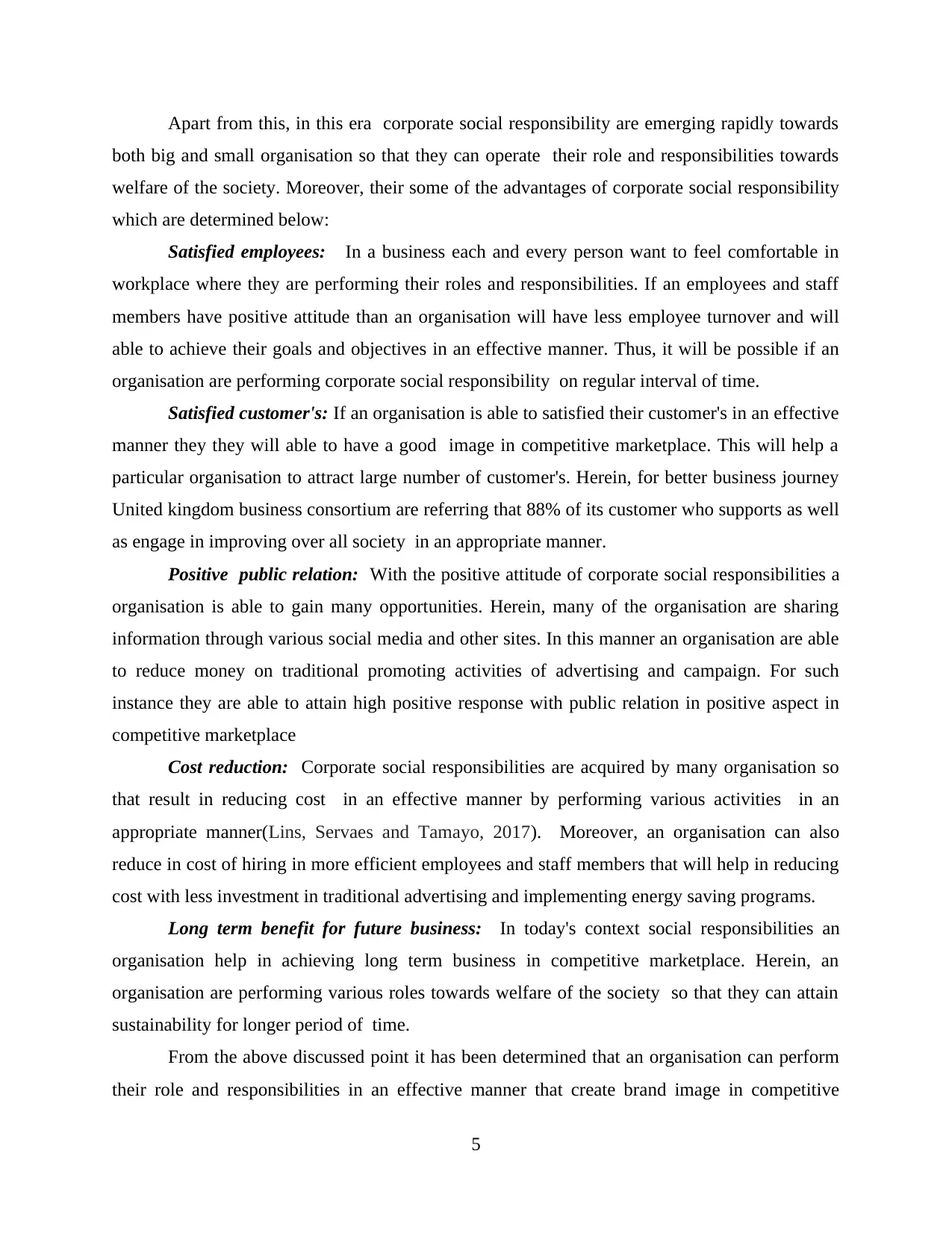
Apart from this, in this era corporate social responsibility are emerging rapidly towards
both big and small organisation so that they can operate their role and responsibilities towards
welfare of the society. Moreover, their some of the advantages of corporate social responsibility
which are determined below:
Satisfied employees: In a business each and every person want to feel comfortable in
workplace where they are performing their roles and responsibilities. If an employees and staff
members have positive attitude than an organisation will have less employee turnover and will
able to achieve their goals and objectives in an effective manner. Thus, it will be possible if an
organisation are performing corporate social responsibility on regular interval of time.
Satisfied customer's: If an organisation is able to satisfied their customer's in an effective
manner they they will able to have a good image in competitive marketplace. This will help a
particular organisation to attract large number of customer's. Herein, for better business journey
United kingdom business consortium are referring that 88% of its customer who supports as well
as engage in improving over all society in an appropriate manner.
Positive public relation: With the positive attitude of corporate social responsibilities a
organisation is able to gain many opportunities. Herein, many of the organisation are sharing
information through various social media and other sites. In this manner an organisation are able
to reduce money on traditional promoting activities of advertising and campaign. For such
instance they are able to attain high positive response with public relation in positive aspect in
competitive marketplace
Cost reduction: Corporate social responsibilities are acquired by many organisation so
that result in reducing cost in an effective manner by performing various activities in an
appropriate manner(Lins, Servaes and Tamayo, 2017). Moreover, an organisation can also
reduce in cost of hiring in more efficient employees and staff members that will help in reducing
cost with less investment in traditional advertising and implementing energy saving programs.
Long term benefit for future business: In today's context social responsibilities an
organisation help in achieving long term business in competitive marketplace. Herein, an
organisation are performing various roles towards welfare of the society so that they can attain
sustainability for longer period of time.
From the above discussed point it has been determined that an organisation can perform
their role and responsibilities in an effective manner that create brand image in competitive
5
both big and small organisation so that they can operate their role and responsibilities towards
welfare of the society. Moreover, their some of the advantages of corporate social responsibility
which are determined below:
Satisfied employees: In a business each and every person want to feel comfortable in
workplace where they are performing their roles and responsibilities. If an employees and staff
members have positive attitude than an organisation will have less employee turnover and will
able to achieve their goals and objectives in an effective manner. Thus, it will be possible if an
organisation are performing corporate social responsibility on regular interval of time.
Satisfied customer's: If an organisation is able to satisfied their customer's in an effective
manner they they will able to have a good image in competitive marketplace. This will help a
particular organisation to attract large number of customer's. Herein, for better business journey
United kingdom business consortium are referring that 88% of its customer who supports as well
as engage in improving over all society in an appropriate manner.
Positive public relation: With the positive attitude of corporate social responsibilities a
organisation is able to gain many opportunities. Herein, many of the organisation are sharing
information through various social media and other sites. In this manner an organisation are able
to reduce money on traditional promoting activities of advertising and campaign. For such
instance they are able to attain high positive response with public relation in positive aspect in
competitive marketplace
Cost reduction: Corporate social responsibilities are acquired by many organisation so
that result in reducing cost in an effective manner by performing various activities in an
appropriate manner(Lins, Servaes and Tamayo, 2017). Moreover, an organisation can also
reduce in cost of hiring in more efficient employees and staff members that will help in reducing
cost with less investment in traditional advertising and implementing energy saving programs.
Long term benefit for future business: In today's context social responsibilities an
organisation help in achieving long term business in competitive marketplace. Herein, an
organisation are performing various roles towards welfare of the society so that they can attain
sustainability for longer period of time.
From the above discussed point it has been determined that an organisation can perform
their role and responsibilities in an effective manner that create brand image in competitive
5
Paraphrase This Document
Need a fresh take? Get an instant paraphrase of this document with our AI Paraphraser
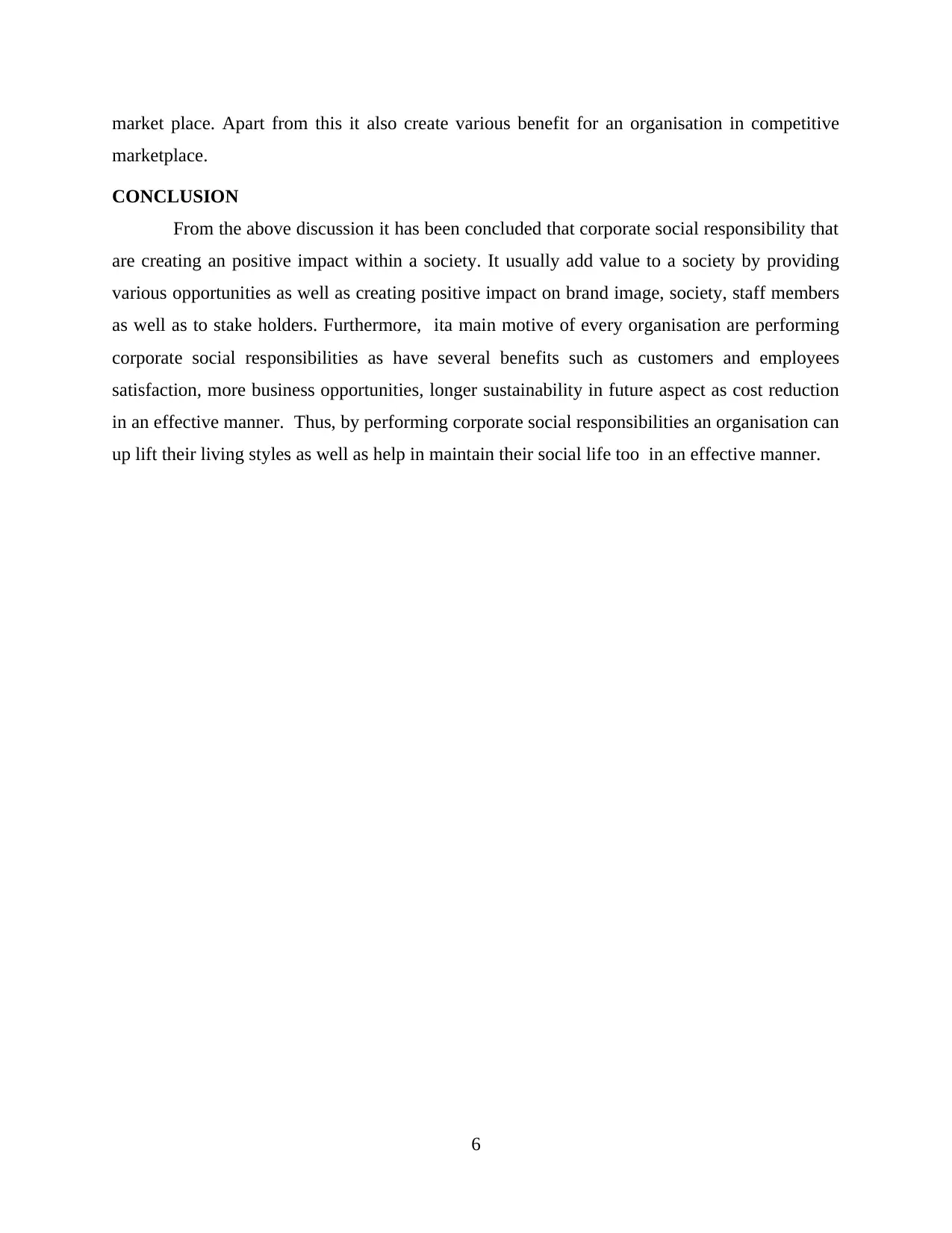
market place. Apart from this it also create various benefit for an organisation in competitive
marketplace.
CONCLUSION
From the above discussion it has been concluded that corporate social responsibility that
are creating an positive impact within a society. It usually add value to a society by providing
various opportunities as well as creating positive impact on brand image, society, staff members
as well as to stake holders. Furthermore, ita main motive of every organisation are performing
corporate social responsibilities as have several benefits such as customers and employees
satisfaction, more business opportunities, longer sustainability in future aspect as cost reduction
in an effective manner. Thus, by performing corporate social responsibilities an organisation can
up lift their living styles as well as help in maintain their social life too in an effective manner.
6
marketplace.
CONCLUSION
From the above discussion it has been concluded that corporate social responsibility that
are creating an positive impact within a society. It usually add value to a society by providing
various opportunities as well as creating positive impact on brand image, society, staff members
as well as to stake holders. Furthermore, ita main motive of every organisation are performing
corporate social responsibilities as have several benefits such as customers and employees
satisfaction, more business opportunities, longer sustainability in future aspect as cost reduction
in an effective manner. Thus, by performing corporate social responsibilities an organisation can
up lift their living styles as well as help in maintain their social life too in an effective manner.
6
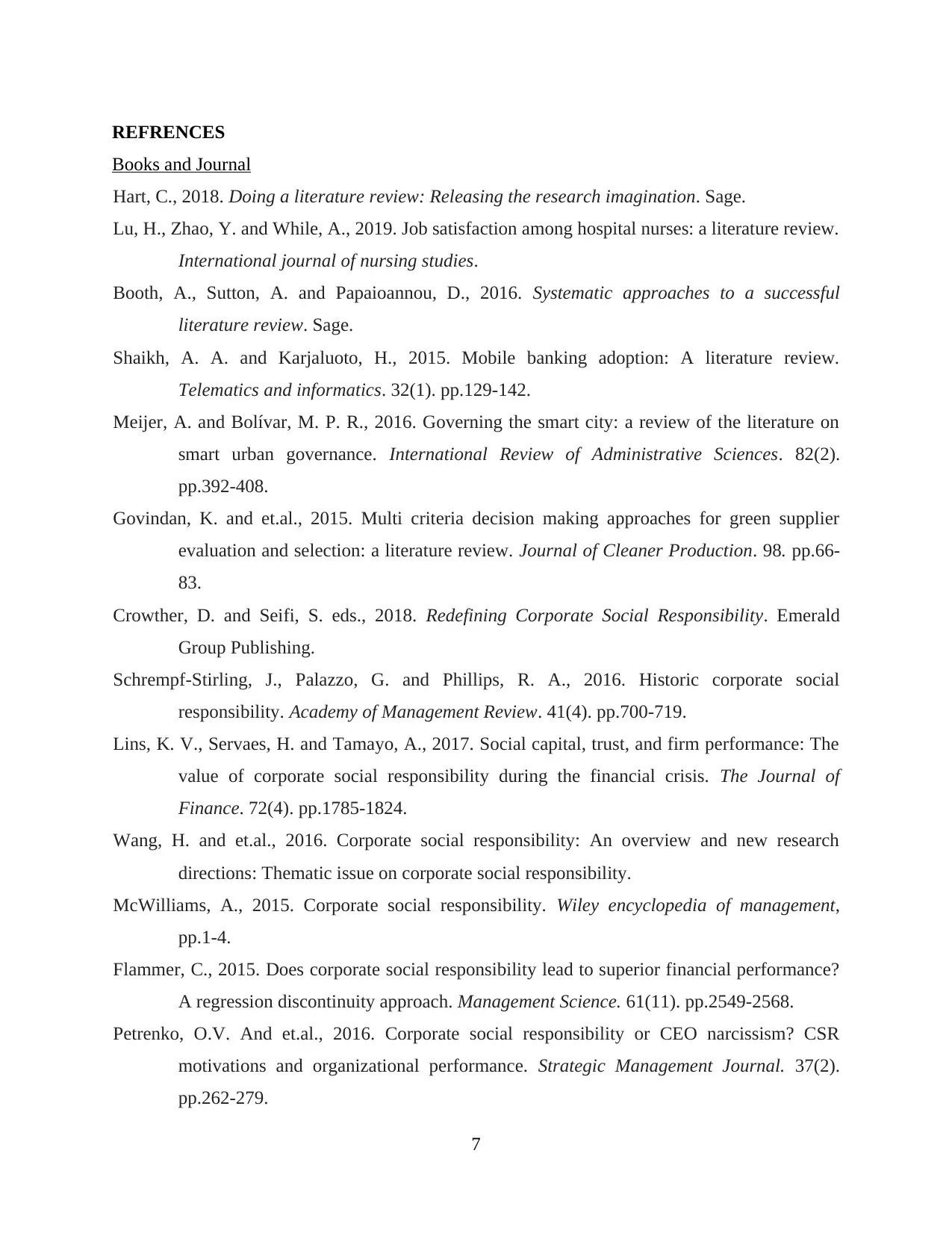
REFRENCES
Books and Journal
Hart, C., 2018. Doing a literature review: Releasing the research imagination. Sage.
Lu, H., Zhao, Y. and While, A., 2019. Job satisfaction among hospital nurses: a literature review.
International journal of nursing studies.
Booth, A., Sutton, A. and Papaioannou, D., 2016. Systematic approaches to a successful
literature review. Sage.
Shaikh, A. A. and Karjaluoto, H., 2015. Mobile banking adoption: A literature review.
Telematics and informatics. 32(1). pp.129-142.
Meijer, A. and Bolívar, M. P. R., 2016. Governing the smart city: a review of the literature on
smart urban governance. International Review of Administrative Sciences. 82(2).
pp.392-408.
Govindan, K. and et.al., 2015. Multi criteria decision making approaches for green supplier
evaluation and selection: a literature review. Journal of Cleaner Production. 98. pp.66-
83.
Crowther, D. and Seifi, S. eds., 2018. Redefining Corporate Social Responsibility. Emerald
Group Publishing.
Schrempf-Stirling, J., Palazzo, G. and Phillips, R. A., 2016. Historic corporate social
responsibility. Academy of Management Review. 41(4). pp.700-719.
Lins, K. V., Servaes, H. and Tamayo, A., 2017. Social capital, trust, and firm performance: The
value of corporate social responsibility during the financial crisis. The Journal of
Finance. 72(4). pp.1785-1824.
Wang, H. and et.al., 2016. Corporate social responsibility: An overview and new research
directions: Thematic issue on corporate social responsibility.
McWilliams, A., 2015. Corporate social responsibility. Wiley encyclopedia of management,
pp.1-4.
Flammer, C., 2015. Does corporate social responsibility lead to superior financial performance?
A regression discontinuity approach. Management Science. 61(11). pp.2549-2568.
Petrenko, O.V. And et.al., 2016. Corporate social responsibility or CEO narcissism? CSR
motivations and organizational performance. Strategic Management Journal. 37(2).
pp.262-279.
7
Books and Journal
Hart, C., 2018. Doing a literature review: Releasing the research imagination. Sage.
Lu, H., Zhao, Y. and While, A., 2019. Job satisfaction among hospital nurses: a literature review.
International journal of nursing studies.
Booth, A., Sutton, A. and Papaioannou, D., 2016. Systematic approaches to a successful
literature review. Sage.
Shaikh, A. A. and Karjaluoto, H., 2015. Mobile banking adoption: A literature review.
Telematics and informatics. 32(1). pp.129-142.
Meijer, A. and Bolívar, M. P. R., 2016. Governing the smart city: a review of the literature on
smart urban governance. International Review of Administrative Sciences. 82(2).
pp.392-408.
Govindan, K. and et.al., 2015. Multi criteria decision making approaches for green supplier
evaluation and selection: a literature review. Journal of Cleaner Production. 98. pp.66-
83.
Crowther, D. and Seifi, S. eds., 2018. Redefining Corporate Social Responsibility. Emerald
Group Publishing.
Schrempf-Stirling, J., Palazzo, G. and Phillips, R. A., 2016. Historic corporate social
responsibility. Academy of Management Review. 41(4). pp.700-719.
Lins, K. V., Servaes, H. and Tamayo, A., 2017. Social capital, trust, and firm performance: The
value of corporate social responsibility during the financial crisis. The Journal of
Finance. 72(4). pp.1785-1824.
Wang, H. and et.al., 2016. Corporate social responsibility: An overview and new research
directions: Thematic issue on corporate social responsibility.
McWilliams, A., 2015. Corporate social responsibility. Wiley encyclopedia of management,
pp.1-4.
Flammer, C., 2015. Does corporate social responsibility lead to superior financial performance?
A regression discontinuity approach. Management Science. 61(11). pp.2549-2568.
Petrenko, O.V. And et.al., 2016. Corporate social responsibility or CEO narcissism? CSR
motivations and organizational performance. Strategic Management Journal. 37(2).
pp.262-279.
7
⊘ This is a preview!⊘
Do you want full access?
Subscribe today to unlock all pages.

Trusted by 1+ million students worldwide

Online
Advantages of Corporate Social Responsibility, 2019.[Online].Available
through<http://www.csrinpractice.com/what-is-csr/>
8
Advantages of Corporate Social Responsibility, 2019.[Online].Available
through<http://www.csrinpractice.com/what-is-csr/>
8
1 out of 10
Related Documents
Your All-in-One AI-Powered Toolkit for Academic Success.
+13062052269
info@desklib.com
Available 24*7 on WhatsApp / Email
![[object Object]](/_next/static/media/star-bottom.7253800d.svg)
Unlock your academic potential
Copyright © 2020–2026 A2Z Services. All Rights Reserved. Developed and managed by ZUCOL.





